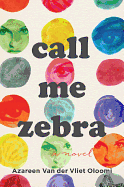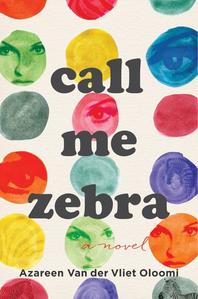
 The eponymous Zebra (née Bibi Abbas Abbas Hosseini) of Azareen Van der Vliet Oloomi's second novel is a young raconteur in search of the sources of her intellectual family's wandering past and cultural legacy. Born in an erudite Iranian family under constant threat, she is smothered in learning--memorizing passages from influential world literature and assimilating a dozen languages before her teens. Her father reads her bedtime stories from Nietzsche, Dante and Kafka. Finally without options in its native land, her family uproots and begins a treacherous refugee journey through Turkey to Spain and ultimately to the "new world" of the United States.
The eponymous Zebra (née Bibi Abbas Abbas Hosseini) of Azareen Van der Vliet Oloomi's second novel is a young raconteur in search of the sources of her intellectual family's wandering past and cultural legacy. Born in an erudite Iranian family under constant threat, she is smothered in learning--memorizing passages from influential world literature and assimilating a dozen languages before her teens. Her father reads her bedtime stories from Nietzsche, Dante and Kafka. Finally without options in its native land, her family uproots and begins a treacherous refugee journey through Turkey to Spain and ultimately to the "new world" of the United States.
Zebra loses her mother along the way, and her father dies when she is just 22 and a student at New York University. Call Me Zebra is the wildly imaginative story of her attempt to reverse her family's journey while toting the baggage of her parents' lessons and memories. She tells the sympathetic professor who gives her his unused sabbatical money, "I intend to dive into the lacunae of exile... to prolong this ridiculous habit of living just long enough to examine the landscapes we traversed during our long and brutal exodus." The professor arranges for a former student to take her under wing in Barcelona, and the enticing young Italian exile Ludo Bembo becomes the Sancho Panza to her Don Quixote. And so, her odyssey begins.
A Whiting Award-winner and MacDowell and Fulbright fellow, Oloomi (Fra Keeler) wears her weighty intellectual bona fides lightly. Call Me Zebra is a novel of philosophical curiosity, so it is awash in quotations and references. Calling herself the "Dame of the Void" and intent on probing the "Matrix of Literature," Zebra liberally fills her narrative with bits and pieces from literary luminaries--not just from classics like Cervantes, Homer and Nietzsche, but also from the more modern masters like Borges, Robbe-Grillet and even Kathy Acker and Paul Auster. She's a motor mouth of observation who often slips into the streets of Barcelona, and the smaller towns of Catalonia, to ramble on about Gaudí, Dali and Picasso. But Zebra is also a young woman with a healthy erotic appetite, and Ludo is more than happy to oblige. In her outspoken way, Zebra directs the maneuvers of their mating and (like Henry Miller) savors their earthy erogenous passion. When sentimental Ludo whispers the love word, she chastises him: "Love is a useless emotion that accomplishes little more than putting two people on a violent collision course from which they will never recover."
Filled with literature, art and sex, Call Me Zebra is rambling and picaresque as quirky and funny as its rambunctious narrator. Its many digressions into philosophy and history are not obstacles--they are stepping-stones. Call Me Zebra is a grand story, but as Zebra describes herself when looking in a mirror, it is also "as troubling as literature, as disquieting as language itself." --Bruce Jacobs, founding partner, Watermark Books & Cafe, Wichita, Kan.
Shelf Talker: With a healthy dose of literary allusions and excerpts, Call Me Zebra is a vibrant novel of a young woman's odyssey into her family's legacy of exile and erudition.

